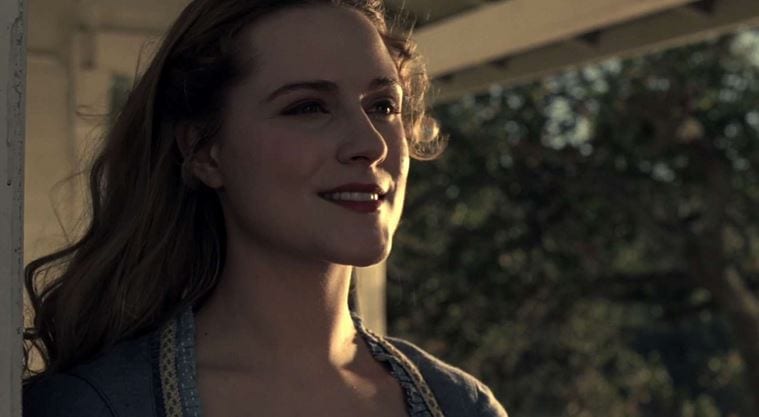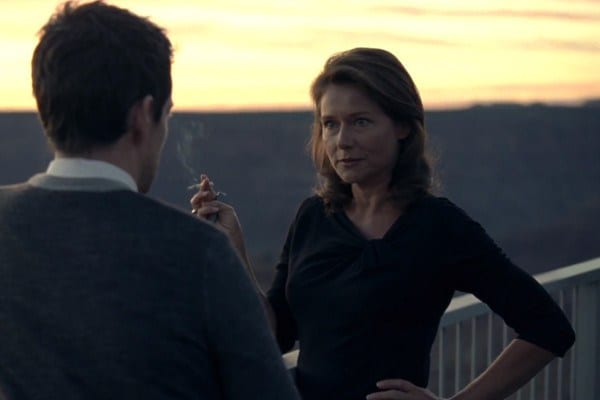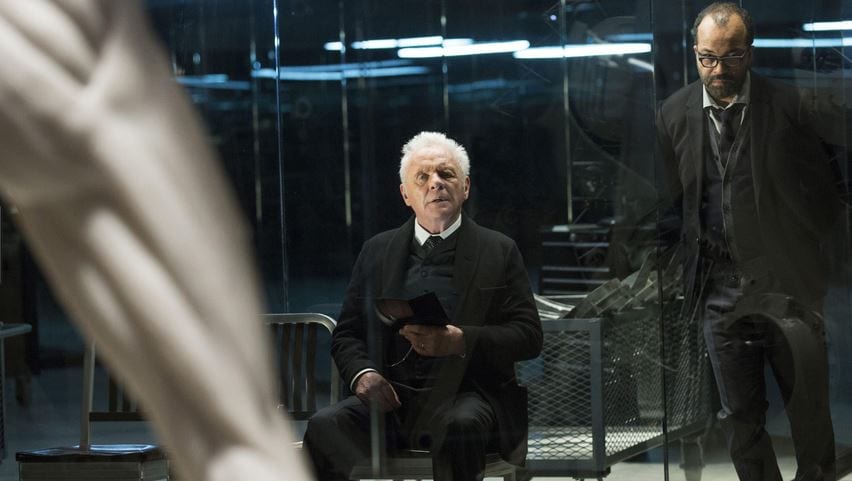And it falls short. The pilot is certainly not a failure, but it cannot shake a tone of trying to prove what it *will* be before laying down the foundation to get it there. What does it want to be? Well that’s obvious, and not even the marketing bothers disguising it—to serve as the successor to Game of Thrones. The good news is that with an opening hour of violence and exploitative storytelling hiding behind pseudo-philosophical conversations, Westworld is well on its way.
I’m already sounding really harsh and I should be clear on something first: this isn’t necessarily a bad show, nor is it a show lacking promise or intrigue. Just as a warning, this review will contain full spoilers for all of “The Original.”
The premise of the show is absolutely fine; there’s a kind of virtual reality-ish fake western town (that I assume is called “Westworld,” but I don’t actually recall anyone saying this within the episode), which is populated by very life-like robots that are referred to as “hosts”. Flies love landing on the robots’ faces and they don’t react at all, in what is actually a fairly clever use of the visual medium (at least the first seven times) and somehow gives off this really creepy, inhuman vibe. This also lets us know that hosts can’t kill anything living…it’s just not in their programming.

The hosts all run on a Groundhog Day-esque script where they live out the same simulation over and over. The pilot heavily follows one host named Dolores, who says good morning to her father the exact same way, is put on a path to possibly run into her robot boyfriend Teddy, goes off to paint in a field, and then returns home to find that a crazy milk-drinking robot murdered her parents.
Any alterations to her routine (like if Teddy gets distracted) come as the result of interactions with the “newcomers,” aka customers at Westworld. They’re all presumably quite rich. I have no clue if they’re in human bodies or if they use VR equipment and robot bodies to get in, but that’s less important than the fact that they get to do whatever the fuck they want in this simulation with no repercussions. Even if a host tries to shoot one (they still perceive danger), nothing happens to the newcomers, though newcomers can kill hosts (they’ll get repaired, don’t worry). One newcomer on the train talks about how he once came to Westworld for a fun family camping trip, but it paled in comparison to when he came back and went “straight evil right away.” It’s just like playing Fable!
As you might expect, many newcomers do horrible things, because this is the only place they can do these things without consequence, and thus the hosts experience a lot of abuse and corporal harm. But since they’re robots, we don’t have to worry about exploring that pesky thing called trauma. I guess to be fair, the way the hosts simply each day is actually quite chilling, so maybe that’s to a point that the show will continue to explore.

Anyway, what do you do when you have a story centered around perfectly docile androids? Yeah, you make them become self-aware and possibly violent. I don’t want to act as though this was necessarily done in a bad way, or as if one day these robots all woke up to realize what was happening. What we see at first are a few malfunctions here and there: the sheriff glitches during a formulaic quest, and the scientists and management behind Westworld all scratch their heads and fuss about bugs in the new software update.
Actually, I’m glossing over it, but there’s a lot going on with the Westworld company bureaucracy. The dude in charge, “Ford”, is the cause of a lot of the problems, and is kind of formulaic trope of a scientist that “takes theory too far.” He’s the one pushing for all these new updates, and almost wants the malfunctions in a way. His motivation seems to be to test the limits of artificial consciousness. Then there’s an important programmer played by Jeffrey Wright (named “Bernard Lowe,” not that I could have told you that without outside help), who has to have to do this juggling act between Ford’s bizarro vision for the hosts and the more corporate concerns about safety and visitor experience, which come from some lady I can only assume is the COO, played by Sidse Babett Knudsen.

In the background is Simon Quarterman, playing another company character whose name I also had to Wikipedia (Lee Sizemore! It’s Lee Sizemore! Wait, seriously?). He writes the scripts for the hosts to act out, so I guess we have him to thank for the milk-drinking murderer. He implies to the COO that he knows Westworld’s management is up to *something*, but he has no idea what that is. She seems to know what it is but doesn’t care to share it with him. Look, I’m all for messy business details, but I’m still trying to play the game of “spot the fly” when there’s a new character on the screen, okay?
Anyway, Dolores’s dad ends up majorly malfunctioning when he finds a photograph that one of the newcomers dropped; it is clearly not in-keeping with the simulated western period, so he begins to question his own existence. After Ford interviews him in the lab, they decommission him, since he’s acting in ways never intended, connecting dots he shouldn’t, and generally weirding everyone out. We think the problem is solved, but the very, very end of the episode shows us that his interactions with Dolores had a lasting effect on her. Despite her perfect[ly creepy] performance at her own interview, we’re treated to a final scene of her back in her routine, only this time she kills a fly.
Female Scientist: Wipe’s complete. You don’t think any of that had an impact on her core code?
Male Scientist: Not good old Dolores. You know why she’s special? She’s been repaired so many times, she’s practically brand-new. Don’t let that fool you. She’s the oldest host in the park.
Chekhov’s sledgehammer.
So all in all, what we have is a pretty run-of-the-mill sci-fi scenario. Western settings are not really my personal taste, in the same way that I really don’t understand the zombie-craze, though I’m a fool for dystopias (oh wait, that makes it “literature”, not “sci-fi”) and robots. For me, it all balances into a premise I feel lukewarm towards, although I’d imagine it has a heavy appeal for others. However, the giant issue for me is that we had to get reminder after reminder that “this show is going to go there.” It’s Edgy™.
Well, if that’s its aim, then mission-fucking-accomplished. This show made it 10 minutes in before its first rape, unlike Game of Thrones, which made it through most of the first episode. Look, if you’ve read anything by me before you know I don’t object to the depiction of rape off-hand, so long as it’s treated with sensitivity and there’s something being explored. But as I pointed out, hosts are violated and brutalized without the writers having to concern themselves with psychological impacts! Yeah, maybe Dolores killing a fly means there’s some processing of trauma, and we’ll see more later, but what it means currently is that any sort of abuse a host experiences is there for us to voyeuristically consume with no deeper thought than, “oh how messed up!” Bold™.
I’m not saying there wasn’t an impact on the viewer from Dolores’s rape and the chilling way in which she snaps back t routine, but at the same time, her witnessing her dad and boyfriend’s murders couldn’t have accomplished that effect anyway? It’s also not made better by the fact that her rapist is then shown later torturing a different host (having slowly drained most of his blood) and insisting that he’s different than those other stupid newcomers:
“I play. The others, they just come here to get their rocks off, shoot a couple Indians. But there’s a deeper level to this game. You’re gonna show me how to get there.”
Wow, raping Dolores seemed really important to you reaching that deeper level, and we really wouldn’t have been able to tell that you were a bad dude without it. Brave storytelling. Bravo.
There’s also lots of blood splatters, just like Game of Thrones! The software update may have infected 200 hosts, so let’s just have a good old cantina shoot-out to take them off the floor so it can be rolled back, despite probably having external power controls. Action! The milk-chugger malfunctions and murders even more victims. Cool!
I’m not exactly saying that these “action” sequences are poorly executed or anything, but just that it was really difficult for me to look at them as anything but Westworld’s rather clumsy attempts to give us a “dark and gritty” setting.
Truth be told, I have absolutely no idea how to address the moment where a scientist lays a kiss on a new host:

I don’t want to say this is the most hamfisted inclusion of lesbian activity in a TV show, but it’s at least the top five. She’s a scientist who supposedly has done this before, right? Does she normally make out with lab experiments?
It’s also worth noting that even if the newcomers were perfect little angels, Westworld’s setting is, well, the wild west, so we’re still treated to a fun sexist and racist backdrop that’s a constant. Thank the gods the gamemakers are as committed to “historical accuracy” as Benioff and Weiss so we can see discrimination against black hosts, hear about missions to go kill some “Indians”, and the milk-chugging robot will talk about how it’s too bad he didn’t get a chance to rape Dolores’s mother before he killed her.
But never fear, guys. Westworld wants to make it clear that none of this is gratuitous because it’s all very ✧・:*meaningful*:・✧. I don’t know how exactly to describe why this aspect falls flat; the show’s premise does lend itself to an exploration of a lot of heavier themes, and certainly raises questions about the nature and meaning of humanity in general. Maybe it’s a tone-thing, or maybe it’s because I’m not willing to cut HBO any slack, but all I can say is that as Ford and Bernard launched into a conversation about evolution being the result of “mistakes”, I could just smell the overtaxed Kurig machine in the writers’ room.

It’s not as if I dislike discussions of ethics in sci-fi, but the issue is that the morality was already a foregone conclusion. The park is set up and people go there to rape and murder, apparently. This has been a done deal for something like 30 years. We’re just left with a discussion between two characters we don’t know, about a minor technological update we don’t understand, for robots we’re watching serve as nothing but punching bags. And this was far from the only conversation that really wanted to be smart.
There was the one between the scriptwriter and the COO, where she cleverly corrected his improper grammar while handwaving at the idea of the management’s “real interests.” There was the random rapist asshole who tortured a Native American host while talking about the “deeper level of gaming.” There were the series of interviews with the hosts, whose actors did a fantastic job letting their eyes slide out of focus, while they were asked questions about the nature of life…you know, just to check that they weren’t becoming self-aware (maybe this prompting doesn’t help?). Oh, and of course Dolores’s father had to quote Henry IV before they made the decision to decommission him; how handy that one of his past roles loved Shakespeare!
I think there’s interesting things to talk about, for sure, but it was nothing that the dialogue actually brought to light for me. In fact, reading a synopsis of this show would have sparked the same level of intellectual intrigue, and done so in a way that didn’t make me roll my eyes.
Even the episode’s direction gave me very strong “Winds of Winter” vibes, where you could tell that they thought shooting everything in an artistic way is a substitute for, well, substance. Just like us watching Tommen get a crown put on its head was supposed to be *meaningful*, the shot of the blood mixing with the milk on the floor was *meaningful*. Oh look, a close up of a music box punch-card, this means something! Here’s naked robots, but it’s in a lab with minimalist, techy music playing, it means something.
And you know, maybe it did for some viewers. I can’t exactly explain why it fell short of mattering to me, however. Part of it is definitely that there’s not a single human character I remotely care about, or even know the name of (the exception being “Ford” because he’s actually talked about a good deal). I’d imagine Magneto and Professor X’s chess game would have lost some impact if the entirety of X-Men hadn’t come before it.
However, I think the larger piece of it is tone. Maybe in some ways that’s too subjective, but I haven’t felt a piece of media try so hard to sell the idea of it being “smart” since Inception. In my experience, smart TV doesn’t try to convince you. If a Y7 cartoon can organically sit its protagonist and antagonist down during a 20 minute episode to discuss the effectiveness of organized government, then I see no reason why Westworld can’t at least pull off something 10% as nuanced. I just think it didn’t care enough to try, but still wanted the credit of appearing that way.
And why would it try, when there was only one thing this show set out to do: draw in the Game of Thrones crowd. In that, the showrunners succeeded. Westworld is essentially indistinguishable from HBO’s flagship right now—just a new genre skin applied to the same formula. It certainly has the potential to be something better, but the motivation for them to do so…well, that’s the real question. As of now it is a very well-produced show that exploits a “historical” setting under the guise of raising questions about the condition of man. So I guess we can expect a lot more of this:


